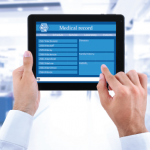NEW YORK (Reuters Health)—New student-documentation guidelines from the Centers for Medicare and Medicaid Services (CMS) require careful implementation to avoid reductions in meaningful teaching physician involvement, according to a new report.
The revised Medicare Claims Processing Manual allows the teaching physician to verify in the medical record any student documentation of services, rather than re-documenting their work. While this could improve medical-student training by giving them more practice writing notes, adding value to patient care, and taking a more active role in that care, there are concerns about potential unintended outcomes.
“Students are in desperate need of education about documentation, and this change was implemented to create an incentive for teaching physicians to spend more time providing feedback on this important aspect of physicianship,” said Dr. Todd Cassese from Albert Einstein College of Medicine, in New York City.
“I think an individual physician will have to determine how to ensure the educational experience doesn’t suffer in the implementation by seeing students as cheap documentation labor rather than as learners in need of guidance,” he told Reuters Health by email.
In their report, online Jan. 15 in the Annals of Internal Medicine, Dr. Cassese and colleagues address three such concerns. First, they fear that medical-student education on note writing will become overly focused on billing at the expense of clinical reasoning and medical decision-making.
This could also lead teaching physicians to concentrate their feedback on whether student notes have achieved specific coding levels rather than on aspects of the note that are more important to medical education.
Second, they worry that students’ ability to write billable notes might not lead teaching physicians to spend more time with them. Even with the reduction in documentation burden, the need to review and approve each student note may not increase a physician’s desire or allocated time to teach students.
Third, the authors are concerned that the revision could further propagate the use of medical students as “student scribes” rather than as meaningful team members contributing to patient care. It isn’t even clear that serving as a scribe has any meaningful educational benefit for medical students.
“Medical school curricula are in great flux right now,” Dr. Cassese said. “One of the major driving factors for the widespread curriculum revision is the intent for students to become major drivers of change in the health care system. How best to teach students to do this is still an active area of scholarship, and we need to be thoughtful about what we are asking students to do, how it will help them learn, and how that impacts the quality of care we provide.”

